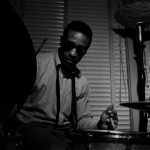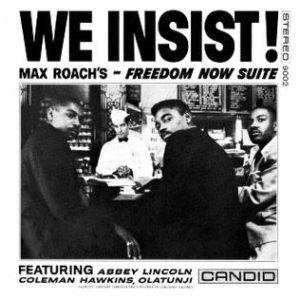The following is from Finn Navin’s class presentation:
Max Roach: 1944 – 2007
- jazz drummer and composer
- started out playing with Duke Ellington
- cofounded Debut Records with Charles Mingus
- outward support of the civil rights movement through music.
The Artwork
- reference to the “sit-in movement”
- peaceful protest during the Civil Rights Movement
- attempted desegregation by sitting in diners legally despite being oppressed.
- used to attract attention
- extremely effective
The Album
- Vocals: Abbey Lincoln
- Trumpet: Booker Little
- Trombone: Julian Priester
- Tenor: Walter Benton
- Tenor 2 on “Driva Man”: Coleman Hawkins
- Bass: James Schenk
- Congas: Michael Olatunji
- Drums:: Max Roach
- Percussion: Raymond Mantilla and Tomas Du Vall
- Released in 1960
- written by Max Roach and lyricist Oscar Brown
- in anticipation of 100 years of the Emancipation Proclamation
- minimalistic, dissonant, and eerie
- reminiscent of Black, Brown, and Beige in the form
Driva’ Man
(0:00 – 1:30)
Driva’ man he made a life
But the Mamie ain’t his wife
Choppin’ cotton don’t be slow
Better finish out your row
Keep a movin’ with that plow
Driva’ man’ll show ya how
Git to work and root that stump
Driva’ man’ll make ya jump
Better make your hammer ring
Driva’ man’ll start to swing
Ain’t but two things on my mind
Driva’ man and quittin’ time
- referring to patrollers during slavery
- in charge of policing slaves
- catching runaway slaves
- the song’s droning feeling emphasizes the lack of hope slaves had.
Freedom Day
(5:30-6:30)
Whisper, listen, whisper, listen. Whispers say we’re free
Rumors flyin’, must be lyin’. Can it really be?
Can’t conceive it, don’t believe it. But that’s what they say
Slave no longer, slave no longer, this is Freedom Day
- Reaction to the emancipation proclamation
- Underlying irony
Triptych: Prayer, Protest, Peace
(12:00 – 12:40, 15:00 – 16:00)
- Abbey Lincoln and Max Roach
- conceived initially as a ballet
- Prayer
- “Cry of an oppressed People”
- Protest
- “Final, uncontrollable unleashing of rage and anger”
- Painful bitterness and anger finally being expressed.
- Peace
- “Is the feeling of relaxed exhaustion after you’ve done everything you can to assert yourself. You can rest now because you’ve worked to be free. It’s a realistic feeling of peacefulness. You know what you’ve been through.”
- Prayer
- No words except “I need peace”
All Africa
(20:40 – 21:40)
The beat has a rich and magnificent history
Full of adventure, excitement, and mystery
Some of it bitter, and some of it sweet
But all of it part of the beat, the beat, the beat
They say it began with a chant and a hum
And a black hand laid on a native drum
- African Tribes are named behind a beat on traditional African drums.
- “interest of American Negroes in the present and future of Africa and also their new pride in Africa’s past and their own pre-American heritage”
Tears For Johannesburg
(30:00-30:30)
- 9 minute instrumental outro, opening with Lincoln vocals.
- Horrible cruelty and discrimination still exist.
“There is still incredible and bloody cruelty against Africans, as in the Sharpeville massacres of South Africa. There is still much to be won in America.”
- Johannesburg is the largest city in South Africa
Reception
- contemporary critics
- very controversial and experimental
- Roach vowed to only play socially relevant music.
“We American jazz musicians of African descent have proved beyond all doubt that we’re master musicians of our instruments. Now what we have to do is employ our skill to tell the dramatic story of our people and what we’ve been through”.
Sources:
https://en.wikipedia.org/wiki/We_Insist
https://en.wikipedia.org/wiki/Slave_patrol
http://www.bbc.co.uk/music/reviews/xn9x/
https://en.wikipedia.org/wiki/Sit-in_movement

